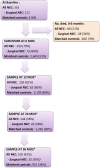Long term healthcare costs of infants who survived neonatal necrotizing enterocolitis: a retrospective longitudinal study among infants enrolled in Texas Medicaid
- PMID: 23962093
- PMCID: PMC3765805
- DOI: 10.1186/1471-2431-13-127
Long term healthcare costs of infants who survived neonatal necrotizing enterocolitis: a retrospective longitudinal study among infants enrolled in Texas Medicaid
Abstract
Background: Infants who survive advanced necrotizing enterocolitis (NEC) at the time of birth are at increased risk of having poor long term physiological and neurodevelopmental growth. The economic implications of the long term morbidity in these children have not been studied to date. This paper compares the long term healthcare costs beyond the initial hospitalization period incurred by medical and surgical NEC survivors with that of matched controls without a diagnosis of NEC during birth hospitalization.
Methods: The longitudinal healthcare utilization claim files of infants born between January 2002 and December 2003 and enrolled in the Texas Medicaid fee-for-service program were used for this research. Propensity scoring was used to match infants diagnosed with NEC during birth hospitalization to infants without a diagnosis of NEC on the basis of gender, race, prematurity, extremely low birth weight status and presence of any major birth defects. The Medicaid paid all-inclusive healthcare costs for the period from 6 months to 3 years of age among children in the medical NEC, surgical NEC and matched control groups were evaluated descriptively, and in a generalized linear regression framework in order to model the impact of NEC over time and by birth weight.
Results: Two hundred fifty NEC survivors (73 with surgical NEC) and 2,909 matched controls were available for follow-up. Medical NEC infants incurred significantly higher healthcare costs than matched controls between 6-12 months of age (mean incremental cost = US$ 5,112 per infant). No significant difference in healthcare costs between medical NEC infants and matched controls was seen after 12 months. Surgical NEC survivors incurred healthcare costs that were consistently higher than that of matched controls through 36 months of age. The mean incremental healthcare costs of surgical NEC infants compared to matched controls between 6-12, 12-24 and 24-36 months of age were US$ 18,274, 14,067 (p < 0.01) and 8,501 (p = 0.06) per infant per six month period, respectively. These incremental costs were found to vary between sub-groups of infants born with birth weight < 1,000g versus ≥ 1,000g (p < 0.05).
Conclusions: The all-inclusive healthcare costs of surgical NEC survivors continued to be substantially higher than that of matched controls through the early childhood development period. These results can have important treatment and policy implications. Further research in this topic is needed.
Figures



References
-
- Ng S. Necrotizing enterocolitis in the full-term neonate. J Paediatr Child Health. 2001;37:1–4. - PubMed
-
- Horbar JD, Carptenter JH. 2007 Very low birth weight database summary. Burlington, VT: Vermont Oxford Network; 2008.
Publication types
MeSH terms
LinkOut - more resources
Full Text Sources
Other Literature Sources
Medical

